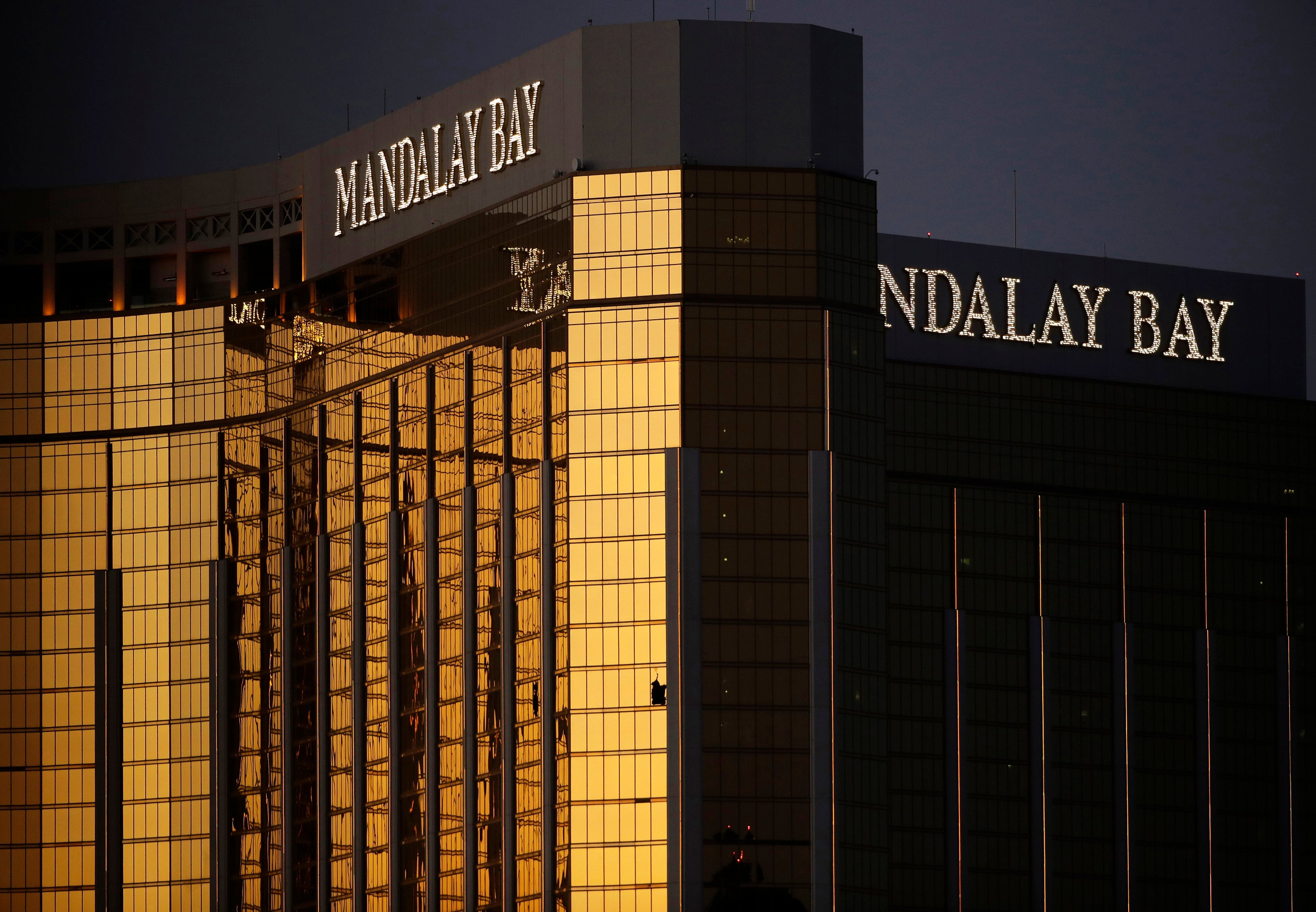Twin tragedies in Las Vegas and Puerto Rico
In the sixth instalment of our series recapping an unprecedented presidency, Joe Sommerlad looks at two horrific events that exposed the commander-in-chief’s abject lack of empathy


The final quarter of Donald Trump’s first year in power began with a horrific mass shooting on 1 October, the deadliest in American history to be carried out by a lone perpetrator.
Stephen Paddock, 64, opened fire on 22,000 concertgoers attending the Route 91 Harvest country music festival on the Las Vegas Strip from the balcony of his suite on the 32nd floor of the Mandalay Bay Hotel.
Choosing from an array of assault weapons, the gunman shot dead 61 people, including himself, and injured 411, with a further 456 injured attempting to flee in the ensuing panic.
Paddock’s motives remain unknown but Trump was quick to label him a “very, very sick individual”, not a particularly helpful or illuminating insight, especially given that he had applied the exact same phrase to Barack Obama when falsely accusing his predecessor of wiretapping Trump Tower.
The president did respond more positively by prompting the Justice Department to outlaw the sale of bump stocks – rifle modifiers that enabled the killer’s rapid-fire spree – with new legislation in place by the following December, the push gathering momentum after the country suffered another devastating shooting in Parkland, Florida, the following February.
While the ban did represent a rare break with Trump’s uncompromisingly commercial instincts in support of a matter of principle and did see him stand up to the powerful National Rifle Association firearms lobby, it shouldn’t be ignored that he had already signed a bill removing restrictions on the sale of guns to the mentally ill.
By 4 October, the president was visiting San Juan in Puerto Rico, lumbering into action two weeks after the island had been battered by Hurricane Maria.
Seven per cent of the territory was still without electricity as Trump jetted in for a five-hour visit to inspect the damage, strolling idly through the debris with his hands in the pockets of his bomber jacket and a bored expression on his face while residents went without water, groceries and basic medical supplies.
He did lend a hand in passing out some much-needed donations but managed to do so in a deeply inconsiderate manner, making a game of it by tossing packets of paper towels to members of the crowd as though he were shooting hoops at a funfair.
The city’s mayor, Carmen Yulin Cruz, who had attacked him on Twitter for his neglect and indifference, described the spectacle as “terrible and abominable”.
Trump later compounded the insult during a televised meeting with emergency officials when he compared the disaster unfavourably to the worse devastation wrought by Hurricane Katrina in New Orleans in 2005.
“Every death is a horror,” the president said, “But if you look at a real catastrophe like Katrina, and you look at the tremendous – hundreds and hundreds and hundreds of people that died, and you look at what happened here, with really a storm that was just totally overpowering, nobody’s ever seen anything like this.”
Failing to read the room, Trump then asked governor Ricardo Rosello how many people had died as a result of Maria and was told 17, prompting him to dismiss the casualties as minimal compared to the 1,833 who had died in Louisiana 12 years earlier.
“A great day in Puerto Rico,” he subsequently beamed on social media, once more neglecting the reality for the island’s 3.5 million inhabitants who were battling to salvage their livelihoods.
Trump’s blundering insensitivity caused further offence on 18 October when he attempted to pay tribute to US army sergeant La David Johnson, one of four killed in action by Islamist militants during the Tongo Tongo ambush in Niger, on a call with Johnson’s widow placed as the family travelled to collect his body.
Florida congresswoman Frederica Wilson, a friend of the family who was present when Myeisha Johnson answered, later said Trump had told the bereaved that her husband “knew what he signed up for” while appearing not to remember his name.
There followed another unseemly row, with the president insisting he had had “a very respectful conversation” with Ms Johnson, not the last time he would have to defend his record with the military or his conduct during a phone call.
Trump told the grieving widow her husband ‘knew what he signed up for’
Trump was no doubt pleased to get away on a tour of Japan, South Korea, China, Vietnam and the Philippines in November after this run of disasters, dropping in to their capital cities to talk tough on trade and North Korea.
The year ended with the president earning the condemnation of British prime minister Theresa May after he retweeted three videos from Jayda Fransen, deputy leader of far-right fringe group Britain First, on 30 November, which purported to document acts of unprovoked violence by Muslims.
May had been laughed at for holding hands with Trump when she visited the White House on 27 January and was clearly reluctant to chastise him if it meant risking a post-Brexit trade deal, baulking at calls to jeopardise the “special relationship” by revoking the invitation of a state visit to London already extended to her US counterpart.
Despite the Russia investigation still looming in the background, and Robert Mueller throwing the book at Trump campaign aides Paul Manafort, Rick Gates and George Papadopoulos and subpoenaing Deutsche Bank, the president spent the run-up to Christmas in charitable mood, handing out gifts to loved ones.
He announced that the US embassy in Israel would be relocated from Tel Aviv to Jerusalem to please Benjamin Netanyahu and signed off on his $1.5 trillion tax overhaul to keep the country club Republicans purring.
Rates were cut to their lowest level since 1939.
Read the full The Trump Review series here



Join our commenting forum
Join thought-provoking conversations, follow other Independent readers and see their replies
Comments